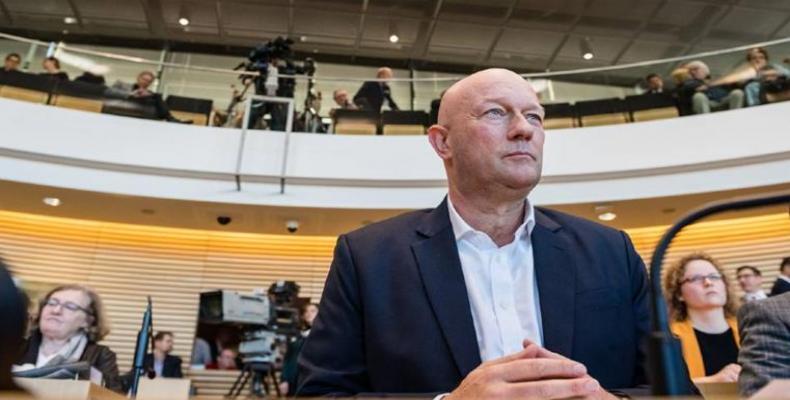Berlin, February 6 (RHC)-- The small state of Thuringia broke a German political taboo on Wednesday after a candidate for the regional premiership was heaved into office with help from the far right for the first time, sending shockwaves to Berlin.
Chancellor Angela Merkel's centre-right CDU party immediately called for fresh regional elections as a way out of the crisis, a call echoed by other mainstream parties.
Thomas Kemmerich, a politician from the economically liberal Free Democratic Party (FDP), was elected as state premier after legislators from the far-right AfD gave him their backing. As a result, 54-year-old Kemmerich beat incumbent Bodo Ramelow of the Left party 45 to 44.
"This is the first time in the history of modern Germany that a state premier has been elected with AfD votes," political scientist Andre Brodocz told broadcaster MDR. While the ballot was secret, Kemmerich must have also had support from CDU MPs, as well as his FDP stablemates.
The result sparked widespread outrage, with Norbert Walter-Borjans, co-leader of Merkel's junior coalition partner the Social Democratic Party (SPD), calling for a "clear position" distancing Merkel's conservatives from the AfD. "What has happened in Thuringia is not just a matter for Thuringia" but for federal politics too, he told broadcaster ZDF.
"This is a bad day for Thuringia, a bad day for Germany," CDU president Annegret Kramp-Karrenbauer said in French city Strasbourg. She called for new elections in the state and blasted regional politicians for breaching the party's policy of no cooperation with the AfD. "New elections would be the best thing for Thuringia," the CDU's secretary-general Paul Ziemiak added.
Members of the two government parties, CDU and the SPD, organised a crisis meeting in Berlin on Saturday to discuss the issue. "The republic is in danger," said Katja Kipping, a leader of the far-left Linke party,
Addressing the local parliament in Erfurt, Kemmerich sought to assuage concerns by insisting he would stick to a pre-election pledge not to partner with the far right. "You have in me a bitter opponent of anything that even hints at radicalism, from the right or left, or fascism," he said, to jeers from local MPs and shouts of "Hypocrite!" and "Charlatan!"
In a news conference, national FDP leader Christian Lindner said if other parties refused to work with Kemmerich to form a government there should be new elections. AfD's support for the liberal politician had been "purely tactical" and the FDP "does not share this party's aims and values," he insisted.
But the party's deputy leader, Wolfgang Kubicki, welcomed Kemmerich's election as state premier. Protesters quickly gathered outside the state parliament in Erfurt, with some holding signs recalling that it was in Thuringia that a Nazi minister was first allowed into government in 1930.
Thuringia belongs to former East Germany, where rejection of the far right has not taken such deep roots as in the West in the decades since the country's 1990 reunification. But the dam breaking there is all the more surprising to observers as the AfD's local regional leader, Bjoern Hoecke, is one of the party's most radical figures, heading a loose movement within the party known as the "Wing."
He has in the past called for a "180-degree turn" in Germany's culture of remembrance for the Holocaust and other crimes of the Nazis, which form a central pillar of the country's post-World War II political life.
Central Council of Jews in Germany president Josef Schuster said he was "horrified" by the vote outcome.


